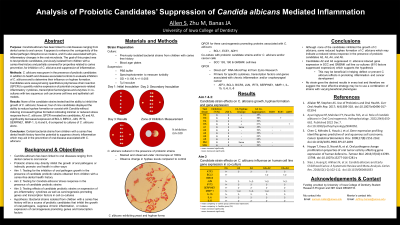Preventive
522 - Analysis of Probiotic Candidates’ Suppression of Candida albicans Mediated Inflammation

- SA
Samuel L. Allen, BS
Dental Student
University of Iowa, Iowa City, IA
University of Iowa College of Dentistry
Coralville, Iowa, United States - MZ
Min Zhu, MS
University of Iowa
- JB
Jeffrey A. Banas, PhD
Director, Iowa Institute for Oral Health Research
University of Iowa College of Dentistry, Iowa City, IA
Iowa City, Iowa, United States - SB
Sheila Britton, n/a
SRG Program Coordinator
University of Iowa, Iowa City, Iowa
Iowa City, Iowa, United States
Presenting Author(s)
Co-Author(s)
Research Mentor(s)
Program Director(s)
Purpose: Candida albicans has been linked to oral diseases ranging from dental caries to oral cancer. It appears to enhance the cariogenicity of the dental pathogen Streptococcus mutans, and it’s also associated with pro-inflammatory changes in the oral microbiota. The goal of this project was to test probiotic candidates, previously isolated from children with a caries-free history and partially screened for properties related to caries prevention, for inhibition of C. albicans and suppression of inflammation.
Methods: C. albicans was grown in the presence of probiotic candidates in addition to health and disease associated controls to evaluate inhibition of C. albicans and to determine their influence on hyphae formation. Candidates were assayed using quantitative polymerase chain reaction (QPCR) to quantify relative expression of potential oncogenesis-related inflammatory cytokines, transcription factors/genes and enzymes in co-cultures with two squamous cell carcinoma cell lines and epithelial cell models.
Results: None of the candidate strains tested had the ability to inhibit the growth of C. albicans; however, four of nine candidates displayed the ability to reduce hyphae formation or coexist with Candida without inducing increased hyphae formation indicating minimal or reduced stress response from C. albicans. QPCR revealed two candidates, A2 and A3, significantly decreased expression of BCL3, BIRC3, JUN, IFIT3, SERPINE1, MMP-1, IL-6 and IL-8 compared to cultures of C. albicans alone.
Conclusion: Certain bacterial strains from children with a caries free dental health history have the potential to suppress chronic inflammation which may aid in the prevention of oral disease associated with C. albicans.
Identify Supporting Agency and Grant Number:

.jpg)